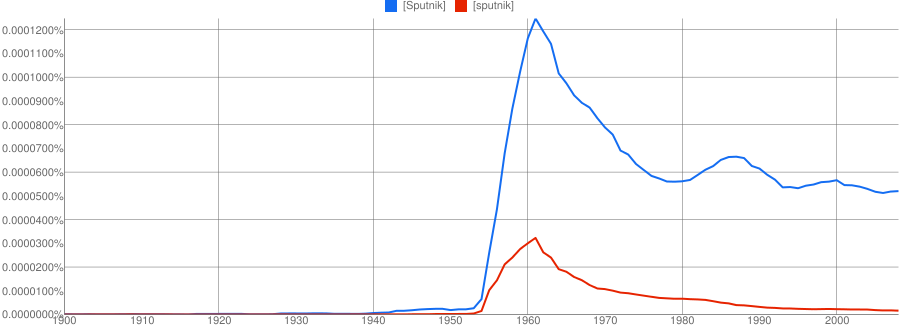The word sputnik does have an entry in the OED, in which both the capitalised and non-capitalised forms are mentioned. However from the examples given of the non-capitalised sputnik, I think it will be clear that it was not a general word for satellite but had a slightly ironic sense. In one 1959 example from the Daily Telegraph the author has seen fit to put the word in quotation marks, which I think may be indicative of an attitude to its use in English at the time.
I do not believe anything I have said here detracts from @Mick's answer in any way, and for which I have voted, since there is no evidence in the OED that it was in general use meaning an "artificial satellite".
a. An unmanned artificial earth satellite, esp. a Russian one; spec.
(usu. with capital initial) the proper name of a series of such
satellites launched by the Soviet Union between 1957 and 1961. The
first Sputnik, launched on 4 October 1957, was the first artificial
satellite.
1957 Times 9 Oct. 10/6 Pride in the launching of the sputnik
(‘fellow-traveller’), as the satellite is called, as well as the
guided missile, were reflected in a speech by Mr. Krushchev..last
night.
1957 Times 30 Oct. 10/2 Mr. Khrushchev replied: ‘To peace and to
the sputnik as a symbol of peace!’
1957 Times 4 Nov. 11/2 The régime which sends a second Sputnik
girdling the earth has just emerged from another of its secretly
contrived shifts of political power.
1958 A. Huxley Let. 15 Feb. (1969) 846 The technical advances in
these psychological, physiological and bio-chemical fields are
probably far more important..than the physical and engineering
advances which have put sputniks into the heavens.
1964 M. McLuhan Understanding Media iii. 44 When Sputnik had first
gone into orbit a schoolteacher asked her second-graders to write some
verse on the subject.
1971 New Scientist 10 June 638/1 China's remarkable progress in
the field is underscored by the weight of its first sputnik
(unmatched..by any satellite launched by France or Japan).
1983 N.Y. Times 7 Jan. a1/4 It is not a dangerous situation..and
we have no worries about the fate of this sputnik.
b. transf. and fig.
1958 Newsweek 10 Feb. 25/1 We may find ourselves confronted with a
sputnik in the chemical, biological, and radiological field, as we did
in missiles.
1959 Daily Tel. 10 Dec. 16/7 Internal ‘sputniks’, pills containing
miniature radio transmitters, which can travel around the intestines.
1963 Punch 17 Apr. 549/1 Such Hollywood sputniks as Frank Sinatra
and Sammy Davis Jnr.
1968 Michelin Guide N.Y. City 124 Coney Island..scenic railways,
loop-the-loops and Ferris wheels compete with phantom trains, tunnels
of love, sputniks.

